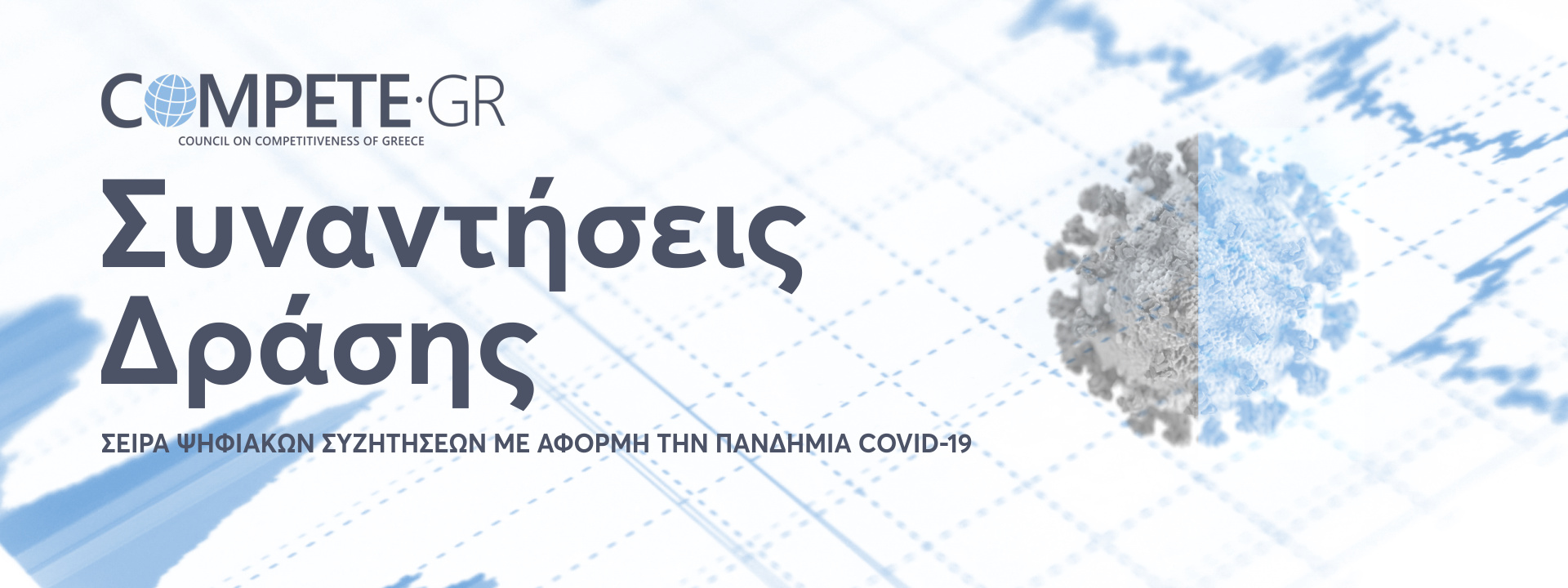KNOWLEDGE SESSIONS – ACTIONABLE DISCUSSIONS
In response to the COVID-19 pandemic, the Council on Competitiveness for Greece (CompeteGR), has been organizing biweekly online knowledge sessions featuring representatives of its member companies, various associations and academia as well as other friends of the Council to discuss specific issues and put forth opinions and proposals.
Each session begins with a brief statement from Council President Mr. Simos Anastasopoulos, followed by a presentation, by Council Executive Director Dr. Venetia Koussia, on Greece’s competitive position according to international reports, and a brief introduction on each of the session’s topics by a knowledgeable and distinguished speaker.
Wednesday, 24 June, 2020
Regional Competitiveness Index and its Role in Supporting Investment of Allocated Funds
- Adonis Georgiadis, Minister of Development & Investment
- Lewis Dijkstra, Deputy Head of the Economic Analysis in the DG Regio (regional & Urban Policy), EU
- Paola Annoni, Prinicpal Statistician, DG Regio, EU
A warm thank you to both our guests from EU Mrs Paola Annoni and Mr Lewis Dijkstra.
We also thank the Minister for Development & Investment Mr Adonis Georgiadis for his honorary presence and strong support to the CompeteGr efforts. In his very introductory remarks, he stressed the critical role of regional competitiveness in a country’s overall competitiveness. And he could not be more right.
We also thank Messrs. Chris Allen, D. Papastergiou, P.Tsakloglou and Chr. Ioannou for their useful complementary interventions.
Regional competitiveness is the ability of a region to offer an attractive and sustainable environment to firms and residents so that they wish to live and work there.
During the last decade EU is publishing – every 3 years – a Regional Competitiveness Index (RCI) aiming at measuring the development of long-term potential and dynamics of a region, identifying the strong and weak areas. The comparison takes into consideration the GDP of each region. Regions are ranked accordingly. Although Greece belongs in the 4th group according to GDP levels (1 is for the poorest and 5 for the richest regions) we notice that its competitiveness needs a lot of effort to reach other competing countries. This finding also means that money is not enough to be competitive.
The RCI is comprised of 74 indices which are allocated into 11 pillars, which form 3 sub-indices, such as a) the Basic dimension b) the efficiency dimension and c) the innovation dimension. The presentation of Mrs P.Annoni attached herewith can be self-explanatory.
However, during the discussion it has been pointed out that the major country’s inefficiencies are also met as regional inefficiencies and can be described as under:
- The quality of institutions
- The quality of basic and vocational education
- The labor market efficiency
- The market readiness in ICT
In condition that regions come closer and fully understand the elements of RCI, then the RCI can be beneficial to them by
- Assisting the regions in attracting investors, as regions will be better placed in capitalizing their strong areas
- Facilitating the sustainable partnership between academia and business by determining specific outputs
- Developing a network with regions and municipalities so that they can benefit by sharing best practices on creating strategic plans, depending on the uniqueness of each region.
We believe that we can redefine through multistakeholders partnerships the framework of the Structural Funds and in combination with the RCI come to a prioritization of projects that will increase competitiveness maintaining equal opportunities.


 Programs & Events
Programs & Events Engage with the Council
Engage with the Council Our Blog
Our Blog Contact us
Contact us
